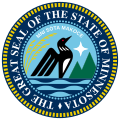| |||||||||||||||||
| |||||||||||||||||
| |||||||||||||||||
The 1857 Minnesota lieutenant gubernatorial election was held on October 13, 1857, in order to elect the first lieutenant governor of Minnesota upon Minnesota acquiring statehood on May 11, 1858. Democratic nominee and incumbent member of the Minnesota House of Representatives William Holcombe defeated Republican nominee John Ide. [1]


